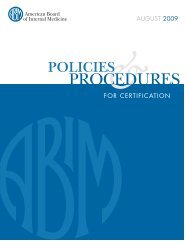The SRA Symposium - College of Medicine
The SRA Symposium - College of Medicine
The SRA Symposium - College of Medicine
Create successful ePaper yourself
Turn your PDF publications into a flip-book with our unique Google optimized e-Paper software.
Papers<br />
Coping involves the effort to overcome, reduce, or tolerate the demands created by our perceived<br />
stressors. One type <strong>of</strong> coping technique is emotion-focused coping. Sigmund Freud believed that<br />
anxiety was a stressful emotion. He observed that people would fend <strong>of</strong>f this distressing emotion<br />
with defense mechanisms (Weiten and Lloyd, 1990). Freud’s ideas were motivated by observing his<br />
patients dealing with anxiety, an intense, negative emotional experience. Anxiety is an unpleasant<br />
state experienced by a combination <strong>of</strong> an uneasy apprehensive feeling, and an increased physiological<br />
arousal such as elevated heart rate and blood pressure. It gives rise to various reactions. For<br />
example, are you defensive when coworkers criticize you or when you are not selected for a promotion?<br />
When coping with a failure over a work project or a competitive loss or when someone<br />
you care about disappoints you, do you tend to deny or distort the problem? Defensive coping is a<br />
common method to handling stress. Defensive coping mechanisms defend against feeling anxious.<br />
<strong>The</strong>y protect our self-perceptions from ego-threatening stressors.<br />
Question 2<br />
<strong>The</strong> second common question <strong>SRA</strong> members are curious about regards the nature <strong>of</strong> defense<br />
mechanisms. Are they normal? Answer – We all use ego defenses, to some degree, on a regular<br />
basis. <strong>The</strong>y fall within the action <strong>of</strong> normal patterns <strong>of</strong> emotional coping. Defense mechanisms<br />
armor us from the emotional discomfort brought on by stress. Defensive maneuvers are largely in<br />
the unconscious. Freud thought the unconscious contains thoughts, memories, and desires that<br />
are well below the surface <strong>of</strong> conscious mindful awareness, but that they nonetheless exert great<br />
influence on our behavior (Weiten and Lloyd, 1997). <strong>The</strong>se unconscious defense mechanisms are<br />
mental maneuvers that work through self-deception. <strong>The</strong> primary emotion guarded against is<br />
anxiety, however anger and guilt are additional emotions people tend to evade through defensive<br />
tactics. Ego defensive maneuvers succeed by self-deception to create a false perception to lessen<br />
the threat to one’s self-esteem.<br />
Question 3<br />
Thirdly, people are curious to know if ego defenses are healthy. Freud developed the defensive<br />
mechanism concept along with his formation <strong>of</strong> the personality components <strong>of</strong> id, ego, and superego.<br />
<strong>The</strong> ego must defend the self from anxious feelings when the id demands pleasure and the superego’s<br />
morals are conflicted. Defending the self-image is hard work for the ego particularly when<br />
one’s sense <strong>of</strong> adequacy and worth are being challenged. Research administrators tell me they feel<br />
pressure to please others, they fear failure, and they are anxious about disappointing losses. All <strong>of</strong><br />
these stressors threaten the ideal image <strong>of</strong> the superego. Defensive coping is an avoidance strategy<br />
and as such <strong>of</strong>ten does not solve one’s conflicts.<br />
Generally, defensive maneuvers are poor ways <strong>of</strong> coping with stress. This being a complicated issue,<br />
the answer is not simple. More <strong>of</strong>ten than not defense mechanisms are not health inducing; however,<br />
there is some suggestion (Taylor, 1989) that some self-deception may be adaptive to our wellbeing.<br />
“Normal” people tend to have overly favorable self-images, overestimate the degree to which<br />
they control chance events, and have unrealistic optimism about the future. Baumeister (1989)<br />
suggests defensive coping is a matter <strong>of</strong> degree and that there is an “optimal margin <strong>of</strong> illusion”.<br />
124 2005 <strong>Symposium</strong> Proceedings Book

















